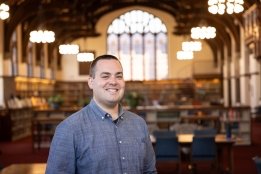New faculty: Tony Liu
From thoughts of designing video games to the impact of AI and machine learning technologies, new faculty member Tony Liu brings a passion for the computer sciences to Mount Holyoke College.
Tony Liu is no stranger to Western Massachusetts, having earned his B.A. from Williams College before going on to the University of Pennsylvania for his Ph.D. Liu joins Mount Holyoke College in the Department of Computer Science and has a passion for how his work can impact mental health and digital interventions.
“A lot of my research focuses on this question of how we get to causation without that randomization handle,” Liu said. “What's really exciting to me, [coming] to a place like Mount Holyoke, is that [this type of questioning is] seen across disciplines. I'm really excited about mental health as well and how [it] interacts with digital interventions. I think there's a lot of opportunity — in terms of the students' diverse interests — to connect with … students on a policy impact level. Hopefully, I can provide some insight … with the methodological tools that I use.”
Liu calls his journey in computer science “long and winding.” From the graphics and game design perspective to artificial intelligence, different aspects of the sciences have spoken to him throughout different stages of his career.
“I think it's a big responsibility when we have folks in academia and computer science, to be able to explain and communicate things effectively to the public, to experts who aren't in computer science. I feel like that piece is what really gets me going, in terms of the accessibility of the information. Trying to make sense of all that's going on right now in the world,” Liu said. “It also ties into why I'm really excited to be joining a smaller, gender-diverse women's college where [there is such a strong emphasis on] teaching. I think that's where we're going to be making the most impact — training and nurturing students.”
Being a part of the faculty at Mount Holyoke College means having access to collaborations, programs and resources to further the work of both faculty and students. These collaborations expand the scope of what is possible, something that Liu is excited to explore.
“I’ve had some great conversations about potential research projects and potential ways to change course structures,” he said. “I'm really excited. I think there's also a lot of really interesting questions to be asked about what data science means in a liberal arts context. [There are] causal questions, and [there are] data science questions. Those two [go] hand in hand across literature, sociology and psychology — [they are] not just isolated to the STEM subjects.”
Academics are driven by the work they do, and some of Liu’s most recent work deals with civility in online social settings.
“Civility in an online forum [or] on social media, [is] not something you can randomize,” Liu said. “It's also such a relevant and politically charged topic nowadays. How do we study this in a way that's ethical and also still gets into the ground truth — the true answer, if you will, or the causal answer. I'm pretty proud of some recent work we did.”
Continuing on this work, some of Liu’s intermediate and long-term academic goals focus on examining the correlation between policy-making and its causal effect, including how this not only relates to social communication but also to health care.
“You can't ask, ‘If we put in this future regulation for nondiscrimination in health care services, what does the [outcome] look like?’” Liu said. “We can't run an experiment saying half the country has this policy in effect, and half the country doesn't have this policy in effect. So, what I'm really interested in is thinking of ways that a very complex interrelationship of systems and methods that I've been thinking about; that these causal methods don't utilize randomized experiments. They might not have enough [differentiating] power to actually disentangle these causal effects. If that's the case, then we'd really need to think about ways to conduct randomized experiments in a more ethical and cost-effective manner. If we can find case studies [without randomization], when [do] these things work, or when these [do] things [not] work? It's going to be potentially pretty impactful in terms of the space of how we go about making policy decisions.”
While Liu’s research background is in machine learning and data science, he is most excited to introduce Mount Holyoke students to the inner workings of systems programming and core computer science, developing that love for the work he has found.
“I'm really excited to think about systems programming,” Liu said. “I'm teaching data structures this fall, and I’m super excited about that because it's the first time students will start to peel back layer by layer without the computer science curriculum. What actually goes into when you're typing code on the computer, what's actually going on inside the computer. You get some syntax and learn about a particular programming language and what it can do. [Then,] you peel back the layers of the onion and get into the systems programming side of things like data structures and computer architecture. I'm actually really excited to teach it, even though my core research area is more data science.”
